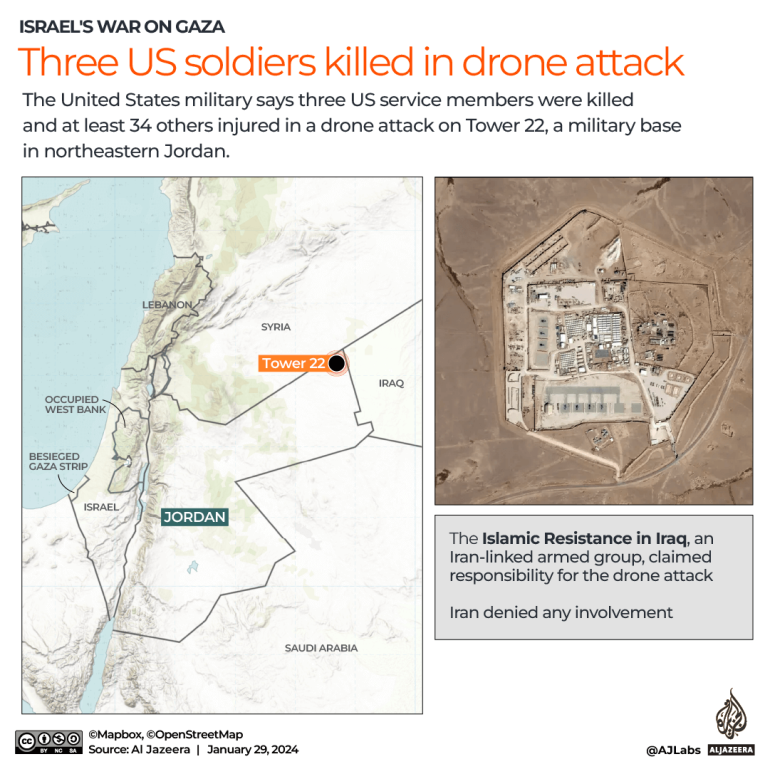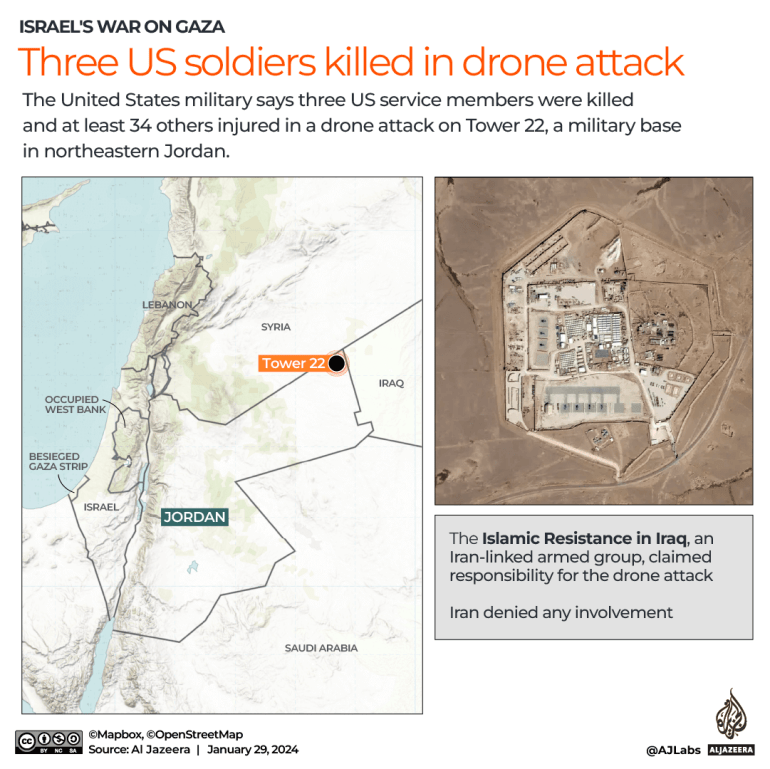The attack has elicited a strong reaction from Washington with President Joe Biden pledging to hold the attackers to account.
The Islamic Resistance in Iraq, an umbrella group of Iran-backed armed groups in the region, claimed the attacks, saying it was in response to US support to Israel’s war on Gaza, which has killed more than 26,000 people.
Here is what we know about the drone strike and the attack site:
What is Tower 22 and where is it located?
Tower 22, which houses a small US logistics outpost, is located in Jordan’s northeast close to the borders with Iraq and Syria.
Public information about the outpost is limited. However, according to media reports, Tower 22 serves as a supply hub for the nearby US garrison of al-Tanf located across the border in Syria.
At least 350 US Army and Air Force soldiers are also stationed there. It is unclear what type of weapons are kept at the outpost and the nature of air defences used.
Since the beginning of Syria’s war in 2011, Washington has spent hundreds of millions of dollars to help Amman set up an elaborate surveillance system known as the Border Security Programme to stem infiltration by armed fighters from Syria and Iraq.
Al-Tanf, located on the Baghdad-Damascus highway, had been key in the fight against the ISIL (ISIS) armed group and has assumed a role as part of a US strategy to contain Iran’s military build-up in eastern Syria.
Currently about 2,500 US troops are stationed in Iraq while 900 deployed in north-east Syria.
Jordan has a close security pact with the US and is one of the few regional allies who hold extensive exercises with American troops. Jordan’s army is one of the largest recipients of Washington’s foreign military financing.

What do we know about the drone strike in Jordan?
The killing of three US service members in an overnight drone strike is the first since Israel launched its brutal military campaign in Gaza on October 7, which has killed more than 26,000 people and triggered responses from regional armed groups.
The unmanned aerial strike targeted the living quarters in Tower 22 wounding 34 soldiers, some of whom sustained minor cuts or brain trauma, according to media reports. The US military said that at least eight of the wounded soldiers were flown out of Jordan for treatment.
Experts have raised questions about why the outpost’s air defences failed to detect the drone.
The identity of the soldiers killed in the attack has not been released yet.
How has the Biden administration reacted?
President Biden said he will hold those responsible to account.
“While we are still gathering the facts of this attack, we know it was carried out by radical Iran-backed militant groups operating in Syria and Iraq,” Biden said in a statement.
Iran has denied it was behind the attack. “Iran had no connection and had nothing to do with the attack on the US base,” Tehran’s mission to the United Nations said in a statement on Monday published by the state news agency IRNA.
“There is a conflict between US forces and resistance groups in the region, which reciprocate retaliatory attacks.”
How have others reacted to the attack?
Jordan condemned the “terrorist attack” and said it was cooperating with ally Washington to secure its frontier and “fight terrorism” on Sunday.
Former US President Donald Trump also condemned the attack, blaming it on the Biden administration: “This brazen attack on the United States is yet another horrific and tragic consequence of Joe Biden’s weakness and surrender.”
US Defense Secretary Lloyd Austin and Republican Senate Leader Mitch McConnell, as well as Senator Roger Wicke, all attributed the attack to Iran.
Democratic leaders including Chuck Schumer, Jacky Rosen and Hakeem Jeffries also voiced in favour of holding those responsible accountable.
Heartbroken and outraged by the death of three U.S. service members and the wounding of many others during the horrific terrorist attack in the Middle East.
Praying hard for all affected.
Every single malignant actor responsible must be held accountable.
— Hakeem Jeffries (@RepJeffries) January 28, 2024
Israel’s Foreign Affairs Minister Israel Katz said: “We stand united in our values and battle against a common enemy. Their sacrifice will always be remembered. Rest in peace. Wishing a speedy recovery to the injured.”
Egypt’s Ministry of Foreign Affairs also released a statement, affirming the country’s “strong condemnation of any terrorist acts that threaten the security and stability of the Hashemite Kingdom of Jordan, expressing full solidarity with Jordan in this delicate situation”.
Have there been other attacks on US interests in the region?
The latest attack comes amid an increasing risk of spillover of the Gaza war as tensions rise and spread in the region.
The US-based, non-profit think tank, Institute for the Study of War, reported that Iran-backed militias have launched over 170 attacks targeting US bases in Iraq and Syria since Israel’s war on Gaza in the wake of the deadly Hamas attack on October 7.
On January 21, the US Central Command said that Iranian-backed groups attacked the Ain al-Assad airbase in Iraq.
The Islamic Resistance in Iraq has claimed responsibility for dozens of attacks against bases housing US troops in Iraq and Syria.
The group said on Sunday that it will continue its attacks as a response to “the massacres committed by the Zionist entity [Israel] against our people in Gaza” on the “strongholds of the enemies.” Israel has been dragged to the International Court of Justice by South Africa over the accusations of genocide committed in Gaza.
The group on Monday carried out a drone strike on Israel.
Iranian-backed Militants Attack Al-Assad Airbase, Iraq
At approximately 6:30 p.m. (Baghdad time) time Jan. 20, multiple ballistic missiles and rockets were launched by Iranian-backed militants in Western Iraq targeting al-Assad Airbase. Most of the missiles were intercepted by… pic.twitter.com/rYaNrRdRtu
— U.S. Central Command (@CENTCOM) January 20, 2024
Lebanese group Hezbollah has been engaged in deadly cross-border exchanges of fire with Israel, while Yemen’s Houthis have carried out multiple attacks against US and Israeli interests. On Monday, the Houthis said they launched a rocket at US warship Lewis B Puller as it sailed through the Gulf of Aden a day earlier. Those attacks have disrupted one of the busiest shipping routes in the world.
The groups – a part of the so-called “axis of resistance” – have targeted Washington for its military support to Israel in its war on Gaza.
Reporting from Tehran, Al Jazeera’s Resul Serdar said Iran does not want a regional escalation.
“The Iranian officials know a direct military confrontation with Israel also means a war with the US which could be a deadly one for Iran,” he said.
While Washington has maintained its official stance that it is not at war in the region, it has been retaliating against the Iran-backed groups in Iraq and Syria and carrying out strikes against Yemen’s Houthi military capabilities.
Colin Clarke, senior research fellow at the Soufan Group, told Al Jazeera that these attacks show that there was a “regional war”.
“There is no denying that. US troops have been killed and the US will respond forcefully whether that is in Iran proper or against the Iranian proxies in the various countries where they operate,” he told Al Jazeera.
